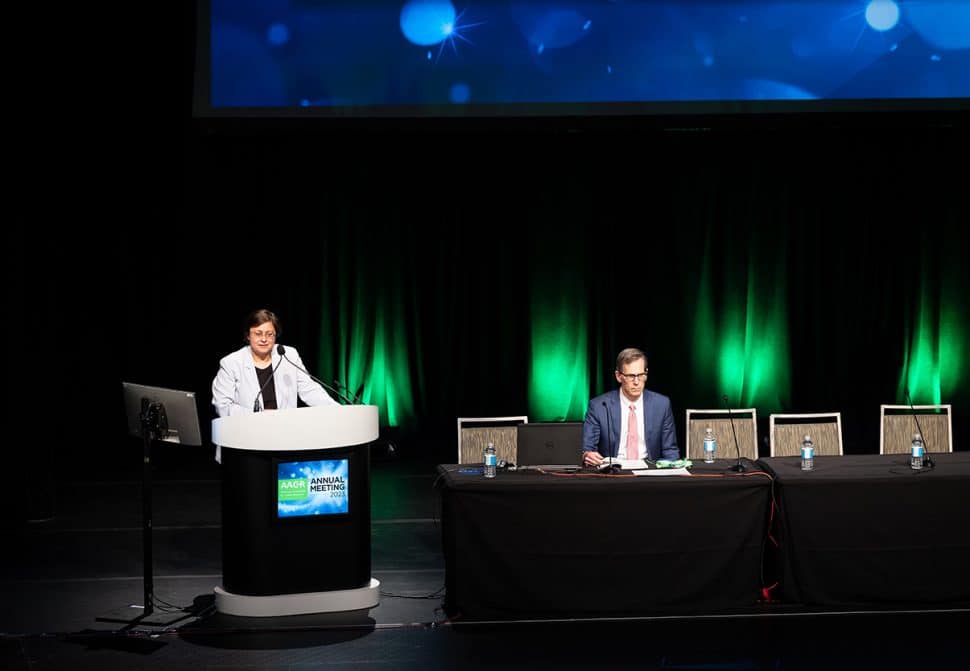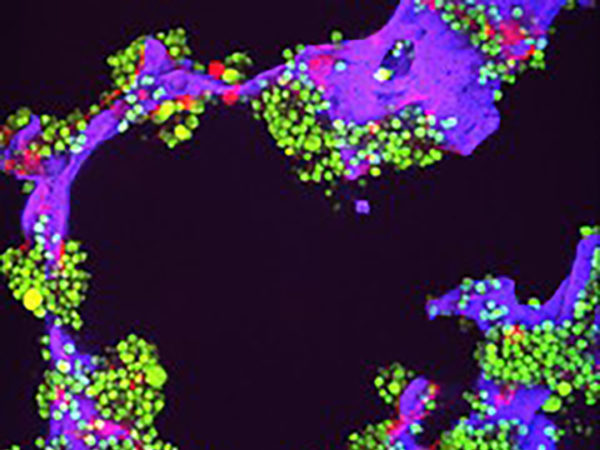AACR Annual Meeting 2023: Closing Plenary Highlights Research Breakthroughs and Next Steps
“Where is the field of cancer research going?” posed Robert Vonderheide, MD, DPhil, as he welcomed attendees to “AACR Annual Meeting 2023 Highlights: Vision for the Future,” the final session of the meeting.
He noted that research presented during the meeting indicated that the future of the field would center on understanding premalignancies; exploring new immunotherapy approaches; utilizing data science, artificial intelligence, and new technologies; and improving community outreach, engagement, and health equity.
Vonderheide also acknowledged the impacts of basic science, clinical research, and new voices that were felt throughout the meeting.
“There’s an incredibly strong lab-driven science that is presented at this meeting, make no mistake about that,” he said, highlighting that about half of the 6,300 submitted abstracts centered on basic, laboratory-based observations. “At the same time, there’s an incredible presence of strong clinical science at this meeting. Hundreds of abstracts presented during this meeting [reported] the results of clinical trials, a record number submitted.
“We felt the power of new faces, new voices, young voices…and balanced perspectives from all those who contribute—and must contribute—to cancer research,” he continued. “Every voice matters. Every idea is a good one.”
Vonderheide then turned the stage over to three members of this year’s program committee to recap key advances shared at the conference.
Sheila Stewart, PhD, highlighted progress in basic and translational research; Elizabeth Platz, ScD, MPH, discussed themes in prevention, population sciences, and disparities; and Shivaani Kummar, MD, reviewed some of the clinical breakthroughs reported at the meeting.
“Something for everyone” in basic and translational research
New findings in basic and translational research expanded our understanding of the impacts of aging, stress, and obesity on cancer; the roles of metabolism, the tumor microenvironment, cancer stem cells, microbiome, and sex hormones on antitumor immunity; and the mechanisms of metastasis, cachexia, and comorbidities, among other topics.
In short, “there was something for everyone,” said Stewart.

Topics spanned the breadth of cancer research, from tumor development to the mechanisms of metastasis and treatment response, and illustrated the complexities of cancer and the importance of basic research.
These discoveries will be key to advancing cancer therapies, Stewart noted.
Insights into the mechanics of cellular uptake and T-cell trafficking, for example, could ultimately aid efforts to improve drug delivery and immunotherapy, respectively. And understanding the contributions of various proteins and pathways to cancer progression will help identify new therapeutic targets.
The take-home message of the meeting, said Stewart, was that cancer is complex. “By understanding this complexity, we’re going to be able to make inroads for treatment,” she said.
“We’re ready for action” in areas of prevention and equity research
Platz, who is editor-in-chief of the AACR journal Cancer Epidemiology, Biomarkers & Prevention, summarized the key takeaways from the meeting’s sessions on cancer prevention and population sciences.
She identified six major themes covered during the meeting: implementation science, cancer health disparities, community engagement, big data, cancer prevention and interception, and COVID-19 and cancer.

According to an analysis by the National Cancer Institute (NCI) published in the AACR journal Cancer Discovery during the meeting, additional action is needed to achieve the goals of the Cancer Moonshot to reduce cancer deaths by 50% by 2047. Results from this analysis were discussed by NCI Director Monica Bertagnolli, MD, and others during the conference.
Reducing cancer mortality will require increasing cancer screening rates, curbing tobacco use, and optimizing precision medicine through implementation science strategies discussed by researchers over the course of the conference. Low-cost, sustainable tweaks to existing infrastructure can help reach this goal, noted Platz.
New insights into cancer health disparities suggested that a combination of biological and societal factors contribute to this problem. Researchers demonstrated that chronic stress increases allostatic load, which can result in cancer-causing genetic alterations; that genetic ancestry can impact cancer risk and patient outcomes; and that molecular markers of cancer differ between races, a difference that could be caused by both societal and biological factors. In addition, systemic barriers to clinical trial participation and inequitable access to cancer screening contribute to health care disparities.
Authentic community engagement will be key to overcoming some of these obstacles, said Platz, and such efforts will benefit from insights from members of target communities.
“Think about community members as citizen-scientists,” she suggested. “Bring the community members into the science domain so they, too, can participate as scientists in analyzing data that comes from their communities.”
Other presentations demonstrated the power of big data to identify molecular markers of cancer risk, which could be used to tailor cancer prevention and interception efforts for individuals with a high risk of cancer. There were also advances in diagnosing and managing hereditary cancers and in understanding the relationship between cancer and COVID-19. While solid tumors did not appear to impact the efficacy of COVID-19 vaccines, patients with hematologic malignancies had lower antibody responses and an increased risk of breakthrough COVID-19 infection.
“We’re ready for action in some areas, but others need more work,” concluded Platz. “We’re getting there.”
“Significant steps forward” in clinical research
Kummar, who served as co-chair of the clinical trials program committee, summarized the promising clinical advances reported at this year’s Annual Meeting.
Clinical trial results underscored the benefit of using immune checkpoint inhibitors earlier in treatment and in combining them with other therapeutic approaches. Results from the AEGEAN phase III trial demonstrated that neoadjuvant durvalumab (Imfinzi) with chemotherapy, followed by adjuvant durvalumab, improved responses in patients with lung cancer. These results built on previously reported results from the CheckMate816 trial, which showed the benefit of neoadjuvant nivolumab (Opdivo) plus chemotherapy for patients with lung cancer.
“Neoadjuvant immunochemotherapy is here to stay,” Kummar said.

Combining immune checkpoint inhibition with an investigational mRNA cancer vaccine or with targeted therapy were also shown to be effective approaches. The KEYNOTE-942 trial evaluated the efficacy of a personalized mRNA vaccine in combination with pembrolizumab (Keytruda) in patients with high-risk melanoma. Unlike other cancer vaccines that have had limited success, this vaccine was designed to target the unique neoantigens of each patient’s tumor, explained Kummar. While longer follow-up is needed, early results are promising, with improved recurrence-free survival in patients receiving the vaccine plus pembrolizumab compared with those receiving pembrolizumab alone.
In another study, researchers identified predictive markers of response to a combination regimen comprised of durvalumab and the angiogenesis inhibitor pazopanib (Votrient) in patients with sarcomas. The study found that sarcomas that responded to the combination therapy were more likely to harbor tertiary lymphoid structures and B cells in the tumor microenvironment prior to treatment.
Targeted therapy approaches also showed promise, with several trials finding clinical benefit from inhibitors of DNA repair proteins, such as ATR and PARP, in adult (TRESR, ATTACC, and HUDSON trials) and pediatric (AcSé-ESMART trial) cancers. In addition, new investigational inhibitors of KRAS G12C proved to be effective against various solid tumor types, such as pancreatic, lung, and colorectal cancers, including those that had progressed after prior treatment with a KRAS G12C inhibitor.
Progress was also made in treating rare cancers, including desmoplastic melanoma (SWOG1512) and biliary tract cancers (KEYNOTE-966). In the realm of hematologic malignancies, an investigational bispecific antibody led to responses in two-thirds of patients with relapsed/refractory multiple myeloma in the REGN5459 trial.
“All of these [trials] put together represent significant steps forward in our ability to improve health outcomes for our patients,” said Kummar.
As another AACR Annual Meeting drew to a close, Vonderheide aptly summarized the status of cancer research: “We’ve made progress,” he said. “We have a lot to do. Science is going to make that happen.
“See you next year in San Diego.”



